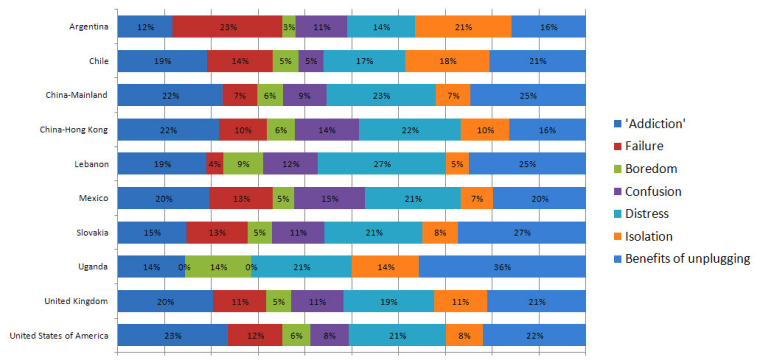College students around the world are "strikingly similar" in their addiction to their cellphones and need to be connected to social media like Facebook, MySpace and Twitter, according to a new study, which tracked the students' withdrawal symptoms after going a full 24 hours without those tools of daily life.
"Media is my drug; without it I was lost,” said one student from the United Kingdom. "I am an addict. How could I survive 24 hours without it?" Said a U.S. student: "I was itching, like a crackhead, because I could not use my phone."
The "Going 24 Hours Without Media" study was based on 1,000 college students from 10 countries: Argentina, Chile, mainland China, Hong Kong, Lebanon, Mexico, Slovakia, Uganda, as well as the U.K. and U.S. The study was conducted by the International Center for Media & the Public Affairs at the University of Maryland, in partnership with the Salzburg Academy on Media & Global Change.
It's not the first time the university has taken on the "unplugged" topic. A year ago, the school released findings of a similar study based on 200 students at the university being asked to "abstain from using all media" for 24 hours. The conclusion was much the same: It was hard as heck to let go of mobile phones, Web access and most things digital. And not everybody succeeded at it then or this time, among a lager, more global group.
"A clear majority in every country admitted outright failure of their efforts to go unplugged," according to the study.
"For people in the modern society,” said a student at Chongqing University in China, "communication [media] is as important as breath." Said a Chilean student: "I didn’t use my cell phone all night. It was a difficult day … a horrible day. After this, I CAN’T LIVE WITHOUT MEDIA! I need my social webs, my cell phone, my Mac, my mp3 always!"
Students "'addiction' to media may not be clinically diagnosed, but the cravings sure seem real — as do the anxiety and the depression," said the study's authors.
"Students from every country wrote about how going 24 hours without media affected their emotional well-being. Even some of those who found benefits in unplugging — fewer distractions, face-to-face connections with friends and family — likened their reactions to the media fast to feelings of a drug withdrawal. They became anxious, stressed, jealous, hostile."
Indeed: "I felt sad, lonely and depressed," said a Slovakian student. "I was literally staring at the wall, because from my point of view, that’s almost the only thing you can do nowadays without a PC, TV or cell phone."
For many students, going without media for 24 hours "ripped back the curtain on their hidden loneliness," said the study.
"When I couldn’t communicate with my friends” by mobile phone, I felt so lonely as if I was in a small cage on an island," said one student from China.
Among other findings in the study:
- "Students reported that media — especially their mobile phones — have literally become an extension of themselves. Going without media, therefore, made it seem like they had lost part of themselves." Said a student from Mexico: "It was an unpleasant surprise to realize that I am in a state of constant distraction, as if my real life and my virtual life were coexisting in different planes, but in equal time."
- "Students around the world reported that being tethered to digital technology 24/7 is not just a habit, it is essential to the way they construct and manage their friendships and social lives." And a key component of that is Facebook: "Increasingly no young person who wants a social life can afford NOT to be active on the site, and being active on the site means living one’s life on the site," said the study's authors, with comments affirmed by students. Said one from Hong Kong: "There is no doubt that Facebook is really high profile in our daily life. Everybody uses it to contact other persons, also we use it to pay attention to others."
- "Students construct different 'brand' identities for themselves by using different communication tools to reach different types of people ... This savvy generation of digital natives can rattle off an arms-length list of communication platforms they use simultaneously but in different ways: They call their mothers, they text and Skype Chat close friends, they Facebook with their social groups, they email their professors and employers. Students consider and sort through all these permutations automatically, but the implications are real for how they construct their personas and social networks via Facebook, Twitter, Skype, QQ, RenRen, Weibo, Windows Messenger, MSN Messenger, BBM, etc., etc…"
- "We no longer search for news, the news finds us ... No matter where the students were from, the amount of information coming to them via their mobile phones or the Internet — via text message, on Facebook, Twitter, chat, Skype IM, QQ, email, etc. — is overwhelming; students are inundated 24/7. As a result, most students reported that they rarely go prospecting for 'hard' news at mainstream or legacy news sites."
Instead, say the study authors, the students "inhale, almost unconsciously, the news that is served up on the sidebar of their email account, that is on friends’ Facebook walls, that comes through on Twitter," which limits postings to 140 characters. And for many, "'140 characters of news is all I need."
Related stories:
- 10 new ways to feed your social-media addiction
- Red Tape: New concern – the social media divide
- Addicted to the Internet? There’s rehab for that
Check out Technolog on Facebook, and on Twitter, follow Suzanne Choney.
